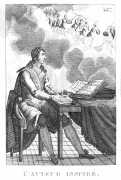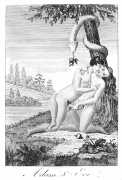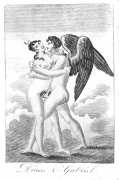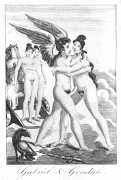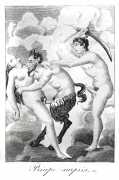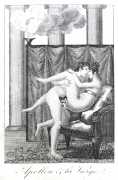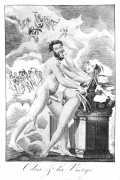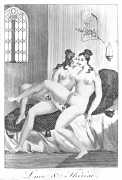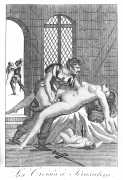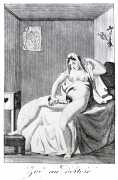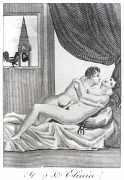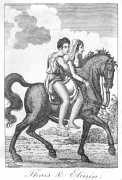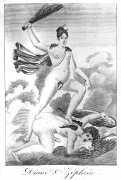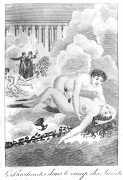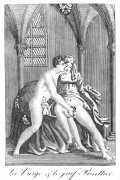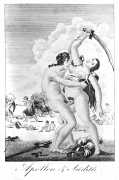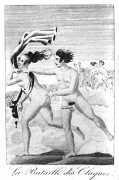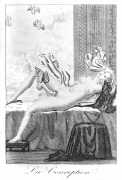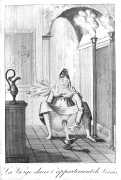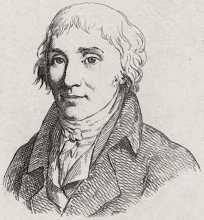 The French poet Évariste Desiré de Forges, Vicomte de Parny (1753–1814) was born in Saint-Paul on the Isle of Bourbon, now Réunion; he came from an aristocratic family which had settled on the island in 1698. When he was ten he moved to France with his two brothers, Jean-Baptiste and Chériseuil, where he studied with the Oratoriens at their college in Rennes, and decided to enter their religious order. He studied theology for six months at the Collège Saint-Firmin in Paris, but decided instead on a military career, explaining that he was not religious enough to become a monk.
The French poet Évariste Desiré de Forges, Vicomte de Parny (1753–1814) was born in Saint-Paul on the Isle of Bourbon, now Réunion; he came from an aristocratic family which had settled on the island in 1698. When he was ten he moved to France with his two brothers, Jean-Baptiste and Chériseuil, where he studied with the Oratoriens at their college in Rennes, and decided to enter their religious order. He studied theology for six months at the Collège Saint-Firmin in Paris, but decided instead on a military career, explaining that he was not religious enough to become a monk.
In 1773 he visited his family back in Bourbon, and during his visit fell in love with Esther Lelièvre, but her father forbade them to marry. Soon after he had returned to France in 1775, he learned that Esther had married a doctor on the island, his unhappy romance inspiring his first published poems, Les poésies érotiques, which appeared in 1778, where Esther appeared under the name of Éléanore. Les poésies érotiques (Erotic Poems) proved to be enormously popular, and has remained in print ever since.
In 1785 Parny moved to Pondicherry in India, where he became an aide de camp to the Governor-General of the French colonies in India. He was not at all happy in India, but he gathered a part of the material for his Chansons Madécasses (Songs of Madagascar), one of the first prose poems written in the French language. He soon moved back to France, where he left the army and moved to a house he owned in the valley of Feuillancourt, between Saint-Germain-en-Laye and Marly-le-Roi.
In 1802 Parny married Marie-Françoise Vally, and, the following year was received into the Académie Française.
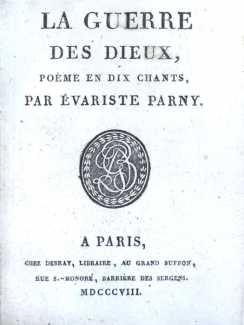 La guerre des dieux (The War of the Gods) appeared in 1799, a suite of ten brilliant and witty poems which mock Christian dogma, and describe with erotic verve the holiest of characters and scenes. Written with sure talent by a keen observer of philosophy and morals, the work enjoyed enormous success from its publication and throughout the nineteenth century. In 1828 Abbé Féletz called the poems ‘the most monstrous and the most revolting that impiety, corruption and immorality have ever produced’, which guaranteed their continued success.
La guerre des dieux (The War of the Gods) appeared in 1799, a suite of ten brilliant and witty poems which mock Christian dogma, and describe with erotic verve the holiest of characters and scenes. Written with sure talent by a keen observer of philosophy and morals, the work enjoyed enormous success from its publication and throughout the nineteenth century. In 1828 Abbé Féletz called the poems ‘the most monstrous and the most revolting that impiety, corruption and immorality have ever produced’, which guaranteed their continued success.
This edition of La guerre des dieux was published by Debray in 1808. The eighteen plates plus a frontispiece, by an unknown hand, were added to some of the copies. They exist in different states, of which this set appears to be the most detailed.


